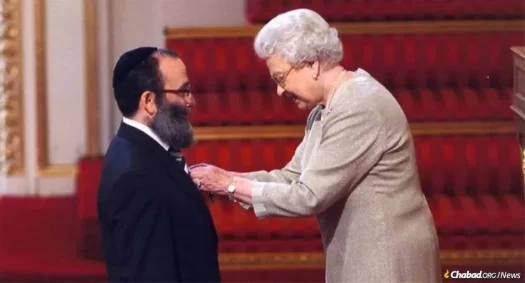
The Queen Was Sensitive to My Religious Needs
by Rabbi Arye Sufrin – chabad.org
The following account was conveyed to Chabad.org by Rabbi Arye Sufrin, executive director of the Chabad Lubavitch Centre in Essex, England, a few minutes after learning of Queen Elizabeth’s passing.
In 2009, I was honored by HM Queen Elizabeth with an award, MBE, “Member of the British Empire.”
The lead-up to it was a lengthy process with much preparations and discussions with the Palace. There was lots of communication that goes between the palace and anyone meeting the queen.
It was a very special time for me. At this time of year, we are told that G‑d, “the king,” is “in the field,” accessible—and receiving everyone with a smiling face.
In this country, we can relate to it because we have a monarch. The queen would go on walkabouts. I met her on other occasions as well. But it is very different meeting her formally, inside the palace.
There were 70, 80 people receiving awards on that day. My name begins with an “S” and things were done in alphabetical order. We waited for several hours before we could meet the queen. Much of that time was spent being given the protocol. We were to address her as Her Majesty the first time, and then as ma’am.
And how do you know when your interview is over? She puts out her hand to shake yours. I knew about this before and was concerned. I had told them before that I do not shake hands with women for religious reasons. And this was playing on my head. What would I do if she tried to shake my hand? I could not refuse the queen.
Now you could not know in advance if the awards would be given by her, her husband or her son or daughter (and, of late, even her grandson).
In my mind, I was hoping it would be the prince, and I would have no issue.
But then, as we waited, I saw on the TV screen the queen entering the room. I then hoped that perhaps she would be wearing gloves. She was not.
We watched and saw how each meeting took place. Sure enough, she was shaking each person’s hand to signal the end of the meeting. I was getting very nervous.
The moment came. I was standing before the queen.
She asked me about our new building. I was not sure what she meant since there was more than one building. She said, “Did my son Edward not open a building for you?” She was right. Three years earlier, we opened a suite of offices for a program called Drugsline, and now I was receiving this award for my work with drug prevention, drug education and services to the area in general.
I had forgotten totally about it, but she had done her research. She said it must be very rewarding to help people in this way, which it is. We had an animated conversation about drug abuse and what the challenges are.
I was there longer than others may have been (we got pictures and video later), at the end, she bowed her head and stepped back slightly, and I knew it was time to step away.
I realized she had done a tremendous amount of research, not just on my projects but also on my personal religious needs.
She was able to retain that knowledge and remember who was who. I was distinctively dressed, and she could not miss that I am a rabbi, but she knew what to do.
Like many Brits, I have a love for the royal family and I have written to her for many personal occasions, happy and sad. And I always got beautiful letters back.
I have always felt honored to have this experience. And I have used it to illustrate the Chassidic parable of the king being in the field in this season. We can relate to this and understand the blessing we make when seeing a king, blessing G‑d who “gave of his glory to flesh and blood.”
I feel her respect for the Jewish community was very special, and I am saddened that this day has come.











